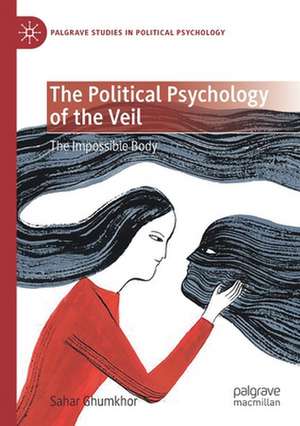The Political Psychology of the Veil: The Impossible Body: Palgrave Studies in Political Psychology
Autor Sahar Ghumkhoren Limba Engleză Paperback – 2 ian 2021
| Toate formatele și edițiile | Preț | Express |
|---|---|---|
| Paperback (1) | 637.93 lei 6-8 săpt. | |
| Springer International Publishing – 2 ian 2021 | 637.93 lei 6-8 săpt. | |
| Hardback (1) | 647.73 lei 6-8 săpt. | |
| Springer International Publishing – 2 dec 2019 | 647.73 lei 6-8 săpt. |
Preț: 637.93 lei
Preț vechi: 750.50 lei
-15% Nou
Puncte Express: 957
Preț estimativ în valută:
122.10€ • 125.83$ • 103.08£
122.10€ • 125.83$ • 103.08£
Carte tipărită la comandă
Livrare economică 03-17 martie
Preluare comenzi: 021 569.72.76
Specificații
ISBN-13: 9783030320638
ISBN-10: 3030320634
Pagini: 274
Ilustrații: XV, 274 p. 5 illus., 4 illus. in color.
Dimensiuni: 148 x 210 mm
Greutate: 0.35 kg
Ediția:1st ed. 2020
Editura: Springer International Publishing
Colecția Palgrave Macmillan
Seria Palgrave Studies in Political Psychology
Locul publicării:Cham, Switzerland
ISBN-10: 3030320634
Pagini: 274
Ilustrații: XV, 274 p. 5 illus., 4 illus. in color.
Dimensiuni: 148 x 210 mm
Greutate: 0.35 kg
Ediția:1st ed. 2020
Editura: Springer International Publishing
Colecția Palgrave Macmillan
Seria Palgrave Studies in Political Psychology
Locul publicării:Cham, Switzerland
Cuprins
1. Introduction: Bodies without Shadows.- 2 The Unveiling Body.- 3. The 'Pure Defense of the Innocent' and Innocence Lost: Imagining the Veiled Woman in Human Rights.- 4. The Woman Question.- 5. The Postcolonial Veil: Bodies in Contact.- 6. The Confessional Body.- 7. Conclusion.
Notă biografică
Sahar Ghumkhor teaches and researches in the School of Social and Political Sciences at the University of Melbourne, Australia.
Textul de pe ultima copertă
Veiled women in the West appear menacing. Their visible invisibility is a cause of obsession. What is beneath the veil more than a woman? This book investigates the preoccupation with the veiled body through the imaging and imagining of Muslim women. It examines the relationship between the body and knowledge through the politics of freedom as grounded in a ‘natural’ body, in the index of flesh. The impulse to unveil is more than a desire to free the Muslim woman. What lies at the heart of the fantasy of saving the Muslim woman is the West’s desire to save itself. The preoccupation with the veiled woman is a defense that preserves neither the object of orientalism nor the difference embodied in women’s bodies, but inversely, insists on the corporeal boundaries of the West’s mode of knowing and truth-making. The book contends that the imagination of unveiling restores the West’s sense of its own power and enables it to intrude where it is ‘other’ – thus making it the centre and the agent by promising universal freedom, all the while stifling the question of what freedom is.Sahar Ghumkhor teaches and researches in the School of Social and Political Sciences at the University of Melbourne, Australia.
Caracteristici
Combines notions of psychoanalysis and postcolonial theory to analyse the desire to know Goes beyond epistemology to the preoccupation with the body and its nexus with liberal freedoms Investigates the psycho-political nature of racism









